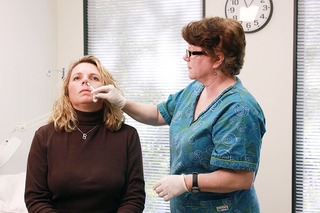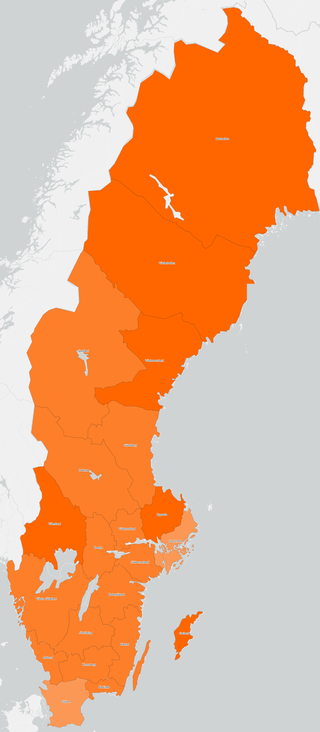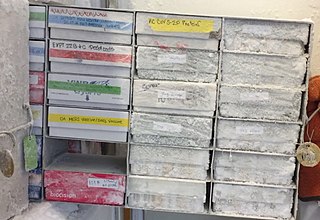Related Research Articles

AstraZeneca plc is an Anglo-Swedish multinational pharmaceutical and biotechnology company with its headquarters at the Cambridge Biomedical Campus in Cambridge,England. It has a portfolio of products for major diseases in areas including oncology,cardiovascular,gastrointestinal,infection,neuroscience,respiratory,and inflammation. It has been involved in developing the Oxford–AstraZeneca COVID-19 vaccine.

Live attenuated influenza vaccine (LAIV) is a type of influenza vaccine in the form of a nasal spray that is recommended for the prevention of influenza.

The European Medicines Agency (EMA) is an agency of the European Union (EU) in charge of the evaluation and supervision of pharmaceutical products. Prior to 2004,it was known as the European Agency for the Evaluation of Medicinal Products or European Medicines Evaluation Agency (EMEA).
The Medicines and Healthcare products Regulatory Agency (MHRA) is an executive agency of the Department of Health and Social Care in the United Kingdom which is responsible for ensuring that medicines and medical devices work and are acceptably safe.
The Therapeutic Goods Administration (TGA) is the medicine and therapeutic regulatory agency of the Australian Government. As part of the Department of Health and Aged Care,the TGA regulates the quality,supply and advertising of medicines,pathology devices,medical devices,blood products and most other therapeutics. Any items that claim to have a therapeutic effect,are involved in the administration of medication,or are otherwise covered by the Therapeutic Goods Act 1989,the Therapeutic Goods Regulations 1990,or a ministerial order,must be approved by the TGA and registered in the Australian Register of Therapeutic Goods.

The European Federation of Pharmaceutical Industries and Associations (EFPIA) is a Brussels-based trade association and lobbying organisation,founded in 1978 and representing the pharmaceutical industry operating in Europe. Through its membership of 36 national associations and 39 leading pharmaceutical companies,the EFPIA represents 1,900 European companies.

Cerebral venous sinus thrombosis (CVST),cerebral venous and sinus thrombosis or cerebral venous thrombosis (CVT),is the presence of a blood clot in the dural venous sinuses,the cerebral veins,or both. Symptoms may include severe headache,visual symptoms,any of the symptoms of stroke such as weakness of the face and limbs on one side of the body,and seizures,which occur in around 40% of patients.
The International Coalition of Medicines Regulatory Authorities (ICMRA) is a global conference of government health bureaucrats.

The Oxford–AstraZeneca COVID‑19 vaccine,sold under the brand names Covishield and Vaxzevria among others,is a viral vector vaccine for prevention of COVID-19. Developed in the United Kingdom by Oxford University and British-Swedish company AstraZeneca,using as a vector the modified chimpanzee adenovirus ChAdOx1. The vaccine is given by intramuscular injection. Studies carried out in 2020 showed that the efficacy of the vaccine is 76.0% at preventing symptomatic COVID-19 beginning at 22 days following the first dose,and 81.3% after the second dose. A study in Scotland found that,for symptomatic COVID-19 infection after the second dose,the vaccine is 81% effective against the Alpha variant,and 61% against the Delta variant.

Vaccination against COVID-19 in Sweden started on 27 December 2020 after the approval of the Pfizer–BioNTech vaccine by the European Commission. In Sweden,the Public Health Agency has been commissioned by the government to create a vaccination plan. Sveriges riksbank,the central bank of Sweden,predicts that efficient vaccination against COVID-19 has macroeconomic benefits. As of 20 April 2022,87.1% of people in Sweden have received at least one dose,with a total of 21,491,717 doses administered. At least one vaccine has been approved for all age groups 12 and older. Children younger than 12 in high risk groups can also be vaccinated.

The COVID-19 vaccination campaign in Italy is a mass immunization campaign that was put in place by the Italian government in order to respond to the ongoing COVID-19 pandemic. It started on 27 December 2020,together with most countries in the European Union.

The Janssen COVID‑19 vaccine,sold under the brand name Jcovden,is a COVID‑19 vaccine that was developed by Janssen Vaccines in Leiden,Netherlands,and its Belgian parent company Janssen Pharmaceuticals,a subsidiary of American company Johnson &Johnson.

SARS-CoV-2,the virus that causes COVID-19,was isolated in late 2019. Its genetic sequence was published on 11 January 2020,triggering an urgent international response to prepare for an outbreak and hasten the development of a preventive COVID-19 vaccine. Since 2020,vaccine development has been expedited via unprecedented collaboration in the multinational pharmaceutical industry and between governments. By June 2020,tens of billions of dollars were invested by corporations,governments,international health organizations,and university research groups to develop dozens of vaccine candidates and prepare for global vaccination programs to immunize against COVID‑19 infection. According to the Coalition for Epidemic Preparedness Innovations (CEPI),the geographic distribution of COVID‑19 vaccine development shows North American entities to have about 40% of the activity,compared to 30% in Asia and Australia,26% in Europe,and a few projects in South America and Africa.

A dispute broke out in January 2021 between the European Commission and the pharmaceutical company AstraZeneca AB about the provision of COVID-19 vaccines during the COVID-19 pandemic,and,in February,spilled out into a dispute over Article 16 of the Northern Ireland Protocol. Vaccination proceeded apace in the UK but more slowly in the EU,and by the end of March 2021,over 30% of the UK population had received at least one dose of vaccine compared to about 8% of the EU population. This was partly due to limited availability of the AstraZeneca vaccine in the EU. The World Health Organization and the European Medicines Agency continued to state that the vaccine was safe and effective. However,a representative of the European Medicines Agency said in June that vaccines based on the mRNA technology should be preferred if available for all age groups,including for the over 60s.
COVID-19 vaccination in Romania started on 27 December 2020. It was announced that the process would be divided into three phases. Medical personnel would be vaccinated first,followed by the population at risk,and finally by the rest of the population. Vaccination was declared free and non-mandatory. As of March 2022,five types of vaccines were authorized to be used in Romania. This is the largest vaccination campaign in the modern history of Romania.

The COVID-19 vaccination programme in the Republic of Ireland is an ongoing mass immunisation campaign that began on 29 December 2020 in response to the COVID-19 pandemic in the Republic of Ireland. Ireland's vaccination rollout has been praised as one of the most successful rollouts in the world and was ranked number one in the European Union in terms of its percentage of adult population fully vaccinated,and was also ranked number one in the EU for the number of booster vaccines administered.

Post-vaccination embolic and thrombotic events,termed vaccine-induced immune thrombotic thrombocytopenia (VITT),vaccine-induced prothrombotic immune thrombocytopenia (VIPIT),thrombosis with thrombocytopenia syndrome (TTS),vaccine-induced immune thrombocytopenia and thrombosis (VITT),or vaccine-associated thrombotic thrombocytopenia (VATT),are rare types of blood clotting syndromes that were initially observed in a number of people who had previously received the Oxford–AstraZeneca COVID‑19 vaccine (AZD1222) during the COVID‑19 pandemic. It was subsequently also described in the Janssen COVID‑19 vaccine,leading to the suspension of its use until its safety had been reassessed. On 5 May 2022 the FDA posted a bulletin limiting the use of the Janssen Vaccine to very specific cases due to further reassessment of the risks of TTS,although the FDA also stated in the same bulletin that the benefits of the vaccine outweigh the risks.

Tixagevimab/cilgavimab,sold under the brand name Evusheld,is a combination of two human monoclonal antibodies,tixagevimab (AZD8895) and cilgavimab (AZD1061) targeted against the surface spike protein of SARS-CoV-2 used to prevent COVID-19. It is being developed by British-Swedish multinational pharmaceutical and biotechnology company AstraZeneca. It is co-packaged and given as two separate consecutive intramuscular injections.
Nirsevimab,sold under the brand name Beyfortus,is a human recombinant monoclonal antibody with activity against respiratory syncytial virus (RSV). It is a respiratory syncytial virus (RSV) F protein‑directed fusion inhibitor that is designed to bind to the fusion protein on the surface of the RSV virus.
References
Notes
- ↑ The European Federation of Pharmaceutical Industries and Associations (EFPIA) is a trade association and lobbying organisation representing the research-based f industry operating in Europe
Footnotes
- 1 2 "Emer Cooke takes office as head of EMA" . Retrieved 16 March 2021.
- 1 2 "ICMRA Chair" . Retrieved 16 March 2021.
- 1 2 "Emer Cooke". Archived from the original on 28 June 2020. Retrieved 16 March 2021.
- 1 2 3 EMA (6 August 2021). "Executive Director". European Medicines Agency. Archived from the original on 6 August 2021. Retrieved 17 August 2021.
- ↑ "WHO | Emer Cooke". WHO. Archived from the original on 14 June 2021.
- ↑ "Irishwoman lands EU drugs agency's top job". POLITICO. 25 June 2020.
- ↑ "AstraZeneca jab: EU regulator 'firmly convinced' benefits outweigh risks" . Retrieved 17 March 2021.
- ↑ "EMA 'firmly convinced' benefits of AstraZeneca vaccine higher than risks" . Retrieved 17 March 2021.
- ↑ "FPÖ – Hauser: EMA-Direktorin hat ihr ganzes Arbeitsleben mit Lobbying für die Pharmaindustrie verbracht". OTS.at.
- ↑ "Gerald Hauser zeigt Brisantes über die Impfstoffzulassung auf!" – via www.youtube.com.